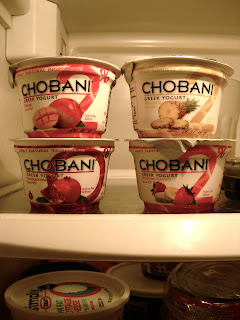 Move over regular yogurt, greek is in and it is taking over grocery stores and refrigerator shelves everywhere. Greek yogurt has a tangier, less sweeter, and a creamier texture than regular yogurt. My favorite brand of greek yogurt is Chobani which has tons of flavors to choose from (I recommend the pineapple and pomagrante. Although, I still have new flavors in my fridge to try) So how does it compare to its rival, regular yogurt?
Move over regular yogurt, greek is in and it is taking over grocery stores and refrigerator shelves everywhere. Greek yogurt has a tangier, less sweeter, and a creamier texture than regular yogurt. My favorite brand of greek yogurt is Chobani which has tons of flavors to choose from (I recommend the pineapple and pomagrante. Although, I still have new flavors in my fridge to try) So how does it compare to its rival, regular yogurt?Both low-fat and non-fat greek and regular yogurt can be part of a healthy diet. They contain calcium and healthy bacteria that are good for your gut. Greek yogurt has a leg up though, it contains about the same amount of calories, doubles in protein, and the amount of sugar is cut in half. More benifits of greek yogurt:
Calcium: Contains 20% of recommended daily amount. This is less than regular yogurt due to the difference in processing.
Sodium: Contains 50 mg of sodium--half the amount of regular yogurt.
Fat: Here's where it gets tricky. Consuming the full fat versions of yogurt can have a negative effect. Some yogurts can have 16 grams of fat (80% of recommended daily amount!). Make sure to purchase the low-fat or non-fat versions which still pack in great flavor and key nutrients.
Carbohydrates: Contains half the amount as regular yogurt (great choice for those going low-carb). Just remember: if the yogurt is sweetened with sugar or sweeteners it will be higher in carbs.
Protein: High in protein which helps you stay fuller longer. A single serving of greek yogurt can have as much protein as a 2-3oz piece of meat (13-17grams). A serving of regular yogurt only contains about 9 grams of protein.
So, we have yet another battle to hash out. Greek vs. Regular:
Greek (5.3 ounces, nonfat, plain)
- Calories: 80
- Total fat: 0 grams
- Cholesterol: 10 milligrams
- Sodium: 50 milligrams
- Sugar: 6 grams
- Protein: 15 grams
- Calcium: 15 percent on a 2,000 calorie diet
Regular (6 ounces, nonfat, plain)
- Calories: 80
- Total fat: 0 grams
- Cholesterol 5 milligrams
- Sodium: 120 milligrams
- Sugar: 12 grams
- Protein: 9 grams
- Calcium: 30 percent on a 2,000 calorie diet.
To answer the question to go greek or not to go greek? I say, GO GREEK! Although regular yogurt is lower in cholesterol and higher in calcium, the other nutrient amounts in greek outweigh those.
Ways to use greek yogurt
- Use plain greek yogurt instead of sour cream (trust me on this one! it's still just as tangy as sour cream, you won't even miss it)
- Mix with herbs to create a dip for vegetables
- Pair with granola and fruit to make a parfait
- Use in place of mayo for things like potato salad, egg salad, and coleslaw
No comments:
Post a Comment